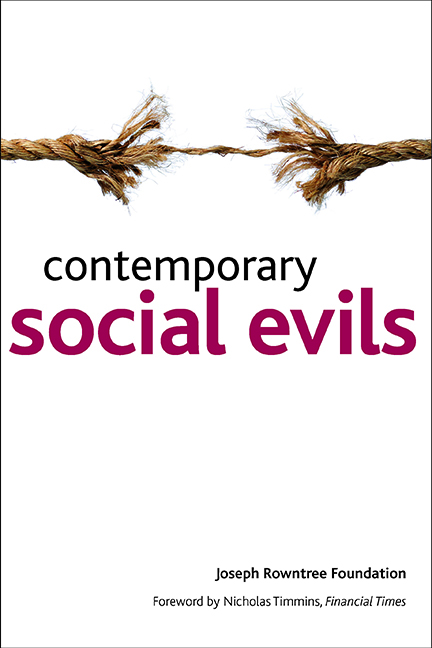Book contents
- Frontmatter
- Contents
- Foreword
- Acknowledgements
- Notes on contributors
- 1 Introduction
- 2 ‘Social evils’ and ‘social problems’ in Britain since 1904
- Section 1 Public Voices
- Section 2 Viewpoints
- A decline of values
- Distrust
- The absence of society
- Individualism
- Inequality
- Section 3 Reflections
- Appendix: How the ‘social evils’ consultations were organised
- Index
19 - Afterword
Published online by Cambridge University Press: 26 January 2022
- Frontmatter
- Contents
- Foreword
- Acknowledgements
- Notes on contributors
- 1 Introduction
- 2 ‘Social evils’ and ‘social problems’ in Britain since 1904
- Section 1 Public Voices
- Section 2 Viewpoints
- A decline of values
- Distrust
- The absence of society
- Individualism
- Inequality
- Section 3 Reflections
- Appendix: How the ‘social evils’ consultations were organised
- Index
Summary
To those familiar with the work of the Joseph Rowntree Foundation (JRF), but unaware of its history, this book on contemporary social evils may come as something of a surprise. Like some respondents to the public online consultation, they may feel uncomfortable that a moral dimension has been so overtly acknowledged to the factual study of social disadvantage and its consequences. Yet anyone who pauses to consider the meaning of a social policy term like ‘poverty’ – among the most consistent areas of the JRF's research interests – can hardly fail to recognise the implications of moral unacceptability, demanding that ‘something be done’ (Piachaud, 1987; Roll, 1992). No less importantly, there is the desire that Joseph Rowntree, successful manufacturer and Quaker philanthropist, expressed for the trusts he endowed a century ago to search out the underlying causes of “weakness and evil” in society.
The question of how its founder's wishes, expressed in splendid Edwardian language, should be interpreted in the 21st century is of self-evident interest to the JRF, which commissioned this work. But what this book and the consultations that preceded it have demonstrated is that the concept of ‘social evil’ is of much more general concern. It has been proved fully capable of provoking impassioned debate about the issues of our own time in a way that less pejorative language could not achieve. The social evils project has allowed a much-needed space for these discussions to take place. It is also a reminder of how an historical perspective can so often enrich and enlighten our understanding of contemporary research discoveries and issues. Jose Harris (Chapter 2) describes the coincidence of an international recession, a government fiscal crisis and the aftermath of an unpopular foreign war that served as the stimulus for national soul-searching amid economic and social pessimism. She is, however, referring to the opening decade of the last century, not our own. Her description of the regional differences that made experiences of the 1930s depression so variable are, likewise, a reminder of how geography may relate to different perceptions of contemporary problems, including a very urban emphasis on gun and knife crime.
- Type
- Chapter
- Information
- Contemporary Social Evils , pp. 225 - 232Publisher: Bristol University PressPrint publication year: 2009



